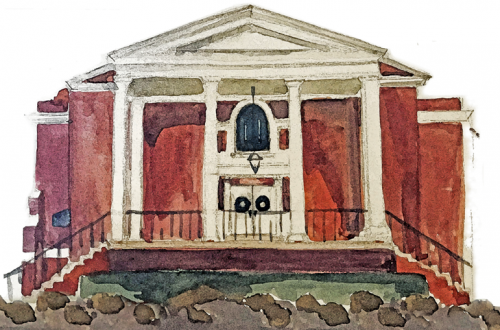For those of you following the conversation about Andy Stanley’s controversial message, a few remarks by way of update:
1. Scot McKnight weighed-in today, and he thinks that critics (including yours truly) have improperly put Stanley on a slippery slope. McKnight also highlights a statement I made in an interview with CT last week in which I said this about Stanley’s sermon: “It was ambiguous at best. It was a total capitulation to the spirit of the age at worst.” After reading my remarks, McKnight wonders what my “best” read of the situation is as opposed to my worst read. My “best” read is that Stanley believes in the Bible’s teaching about human sexuality, but for whatever reason muted that belief in his sermon. If that is the case, then the question becomes whether the ambiguity was intentional or unintentional.
If it was unintentional, certainly he could have clarified the matter by now. The audio of his most recent sermon is not yet available, but The Christian Post’s coverage of the message doesn’t indicate that any clarification was forthcoming. If it was intentional, then for what purpose did he do it? To steer clear of divisive subjects while in the pulpit? To make North Point a more attractive place for homosexuals to attend? Or perhaps he just thought adultery was the only relevant moral question in the story he was telling. Whatever the reason, it is difficult to imagine a good reason for intentionally leaving the impression that adultery is sin while homosexuality may not be.
It’s pastoral malpractice to believe the truth in private but not to affirm it plainly from the pulpit–especially when a pastor invokes the issue in a way that seems calculated to communicate something about homosexuality which the pastor really does not believe. The text that comes to mind is 2 Corinthians 4:2,
We have renounced disgraceful, underhanded ways. We refuse to practice cunning or to tamper with God’s word, but by the open statement of the truth we would commend ourselves to everyone’s conscience in the sight of God.
So from my perspective, even the best case scenario may still be a cause for some concern.
2. This conversation is as much about ecclesiology as it is about the moral status of homosexuality. Much of the disagreement stems directly from differences over the meaning of church membership, church discipline, and pastoral care. As I said in my earlier post, the failure to practice redemptive church discipline is an open scandal in countless evangelical congregations. It is for this reason that so many non-Christians look at our churches and conclude that the pews are full of hypocrites. When churches fail to discipline, the critics are right. Eventually, there will be no difference between the church and the world where redemptive discipline is absent.
3. Readers have directed our attention to North Point’s student ministry volunteer application. There is a section in it that addresses “sexual behavior.” Here it is:
Regarding Sexual Behavior
We teach that sex was created by God as an expression of intimacy between a man and woman within the context of marriage. Volunteers who embrace lifestyles or behaviors that conflict with this teaching will eventually find themselves having to pretend to be something they are not or believe something they don’t. In an effort to protect you from a potentially awkward situation, we ask the following:
• If you are involved in a sexual relationship and are not married, we ask that you not volunteer in family ministry at this time.
• If you are pursuing a same sex relationship, we ask that you not volunteer in family ministry at this time.
• In the spirit of being a good role model, if you are single and living with a member of the opposite sex, we ask that you not volunteer at this time. We do not want to put you in the awkward position of having to explain your arrangement if members of your group visit your home.
• If you are married and are currently involved in a sexual relationship outside of your marriage, we ask that you not volunteer at this time.
I don’t think this statement is perfect. It’s framed as if the main concern is to keep potential volunteers true to themselves rather than to emphasize the church’s commitment to holiness and integrity. Having said that, this statement would have been very useful if Pastor Stanley would have alluded to it publicly. Simply restating the first line of this policy in his sermon might have prevented listeners from concluding that homosexual behavior is permissible among members/volunteers at North Point. But there again we are left with our earlier question: Why didn’t he bring it up?




10 Comments
Matt Privett
Wow. That application is something else, but it echoes what seems to have been the spirit of Stanley’s sermon. The concern isn’t with sin, or even potential sin, but with the avoidance of what would be “awkward.”
There is a difference between a pastor who teaches something wrong and a false teacher. Stanley certainly seems to be toeing the line toward the latter.
Patrick Mead
Scott McKnight’s logic is flawed. Jesus pointed out the woman at the well’s sin. And, I am sure the woman forgiven was confronted with her sin. Otherwise, why the need to be forgiven.
Robert Angison
I continued to be stunned at the response from people who continue to provoke this issue when a simple survey of the entire sermon and basic teachings from the ministry show what Andy Stanley believes about homosexuality and how his church has dealt with it.
The point in the illustration is about offering, extending grace to people who deeply hurt us.
That is it, and it doesn’t need to be extended. Why then is that Andy Stanley’s discussing homosexuality in his context must meet the standards of this author and others associated with his institution?
He’s clearly articulated his position in the past and the point of this illustration wasn’t to discuss the nature of homosexuality. Frankly I’m thrilled he hasn’t responded to this tempest in a teapot. I continue to be saddened at the nature of the quest to feret out all forms of perceived liberalism without asking the people involved, directly, what their point is in making these illustrations.
As a young minister working with next generation ministry this issue is exceedingly important. How I articulate my views on it probably differ from the redoubtable host of this blog. They probably differ from the respectable president of the Southern Seminary. Yet they seem to resonnate with the generation to which I minister because they desire nuance and appreciate honest engagement and not polemical statements.
How are we to question the authority and ministry of an autonomous church (that clearly wants nothing to do with our convention) who has a thriving ministry reaching people with the explicit Gospel of Christ? What benefit is it for any of us to be waylaid on this minor issues (which has be thoroughly discussed within his ministry) when the greater challenge of the Gospel lays before us?
The question from my generation is why is it that our denominational leaders refuse to understand the nuance that goes into a reasonable discussion about homosexuality? We can still call sin, sin and recognize that there are people struggling mightily with this issue that have a passion for Jesus Christ. Why is this the issue of theological conversativism right now? Why not how you’re preaching the Gospel?
I doubt there are many SBC churches that measure the amount of people saved and baptized at Northpoint and I praise God for their ministry…for all their ministry. Why is this not the issue and a pointless diversion into a game of semantics?
Adam Shields
Denny, I agree. The issue is far more about ecclesiology than it is about homosexuality. But that is not what you keep bringing up. It is not what Mohler brought up. It is not what most people bring up.
If you want to have a discussion about ecclesiology, then talk about what is wrong with Northpoint’s ecclesiology. I welcome that discussion. I think that is a fruitful discussion.
I am a member of Northpoint and think there are some real weakensses in the mega-church model’s ecclesiology. But that is not what you keep bringing up. And that is not what most blogs keep bringing up. You keep bringing up what was not said in an illustration that was not about homosexuality.
On the whole, I think that I am a small church, close contact with pastor guy. But I go to Northpoint in large part because that is where my family was going when I moved to Altanta. And I now really do feel called here. I will continue to be here, and I will continue to prod and poke in areas that I think there are weaknesses.
But rougthly 1 out of every 210 people in all of Atlanta attend one of the Northpoint services on any given week. Every one I know that works in business (especially if they are young and single) has said you can not work in Atlanta and not get invited to a Northpoint campus. Several parenting blogs complain that it is not possible for teens to not get invited to a Northpoint teen event.
So while there are weaknesses with Northpoint, throwing Andy under the bus for trying to serve God and get people into the church does little to make me want to pay any attention to you or Mohler. Instead it reminds me that much of the church is more interested in being right theologically than winning people for Christ (which is really the point of the last series of sermons.)
Paula
Something I think has gotten lost in this discussion is a point Dr. Mohler made:
“And disciples are only made when the church teaches all that Christ has commanded, as the Great Commission makes clear…The urgency to reach people with the Gospel can, if the church is not faithful and watchful, tempt us to subvert the Gospel by redefining its terms. We are not honest if we do not admit that the current cultural context raises the cost of declaring the Gospel on its own terms.”
I think that we have had it so easy for so long in this country that the biblical concept of counting the cost has almost no meaning to us. When we consider that our brothers and sisters in places like Afghanistan, Mali, and N. Korea face prison, torture, and death for simply declaring they are Christians, we must seem rather silly – even shallow – worrying and fussing that we might offend people with the plain, simple teaching of God’s word in a free country.
GLW Johnson
Scott McKnight’s pontifications are growing increasingly shrill. His recent remarks over at the Biologos blog informing the masses that a actual historical Adam is of no doctrinal importance as well as his blurbing Kenton Sparks’ most recent book debunking Biblical authority-are only a few examples that have lead me to pretty much disregard anything he has to say about anything.
Rick
Say what you will about his position on this situation, but I have not read, including in his newest book, where McKnight debunks Biblical authority
Larry Geiger
“Instead it reminds me that much of the church is more interested in being right theologically than winning people for Christ”
You might want to re-think this statement? You can’t have one without the other. People cannot be won to Christ with wrong theology. You can’t have right theology and not win people for Christ. They are one in the same. This is a very odd statement to me. People come to Christ by simply reading the Bible.
Adam Shields
I don’t want to take too strong of a stand on this, but I mostly agree with you. But there are several biblical examples of this and some more practical ones. Practical first, people that are incapable to fully understanding theology can still become Christian, mentally disabled and handicapped can become Christians I believe and not have a complete understanding of theology. Similarly, I believe that there are many that have bad theology because they have bad teachers, but are striving after God and should be considered Christians.
Biblically, I think that is what Jesus meant about the Pharisees, that they had the right theology, but the did not allow it to reach to their heart. I think this is also what Paul was referring to in I Cor 13 and what many of the OT prophets were talking about with statements like, “I desire mercy not sacrifice.”
I agree theology is important and I don’t want to set them up as opposites. I want people to have both good theology and win people for Christ and love them as Christ instructs. But I think that we are in a place in the US where we emphasize right theology too much and not enough right action. Both are important and as you say, it is hard to separate. But I believe that we often do separate them.
GLW Johnson
Rick
I referred to Sparks’ book that casts doubt not only on the Bible’s authority but the very nature of inspiration- and McKnight , who expressed the fairly common guarded remark ‘ I may not agree with everything in the book’ nonetheless wrote an endorsement for it.